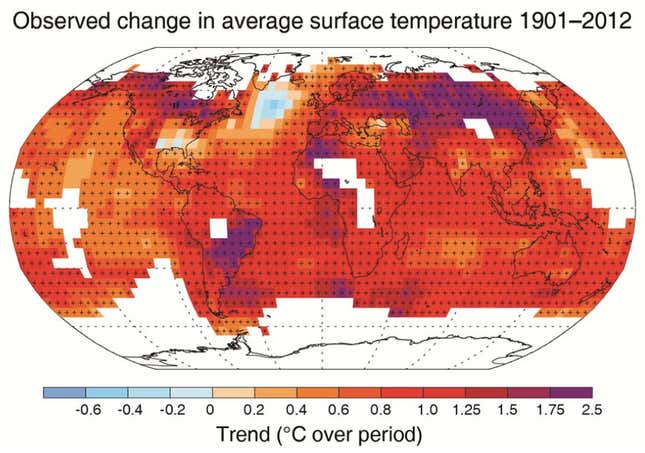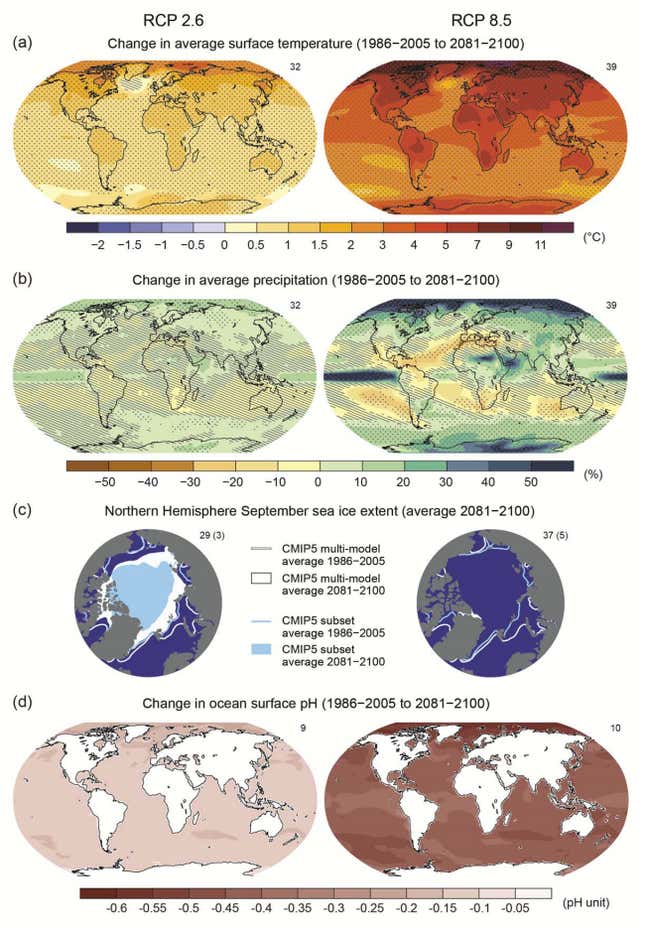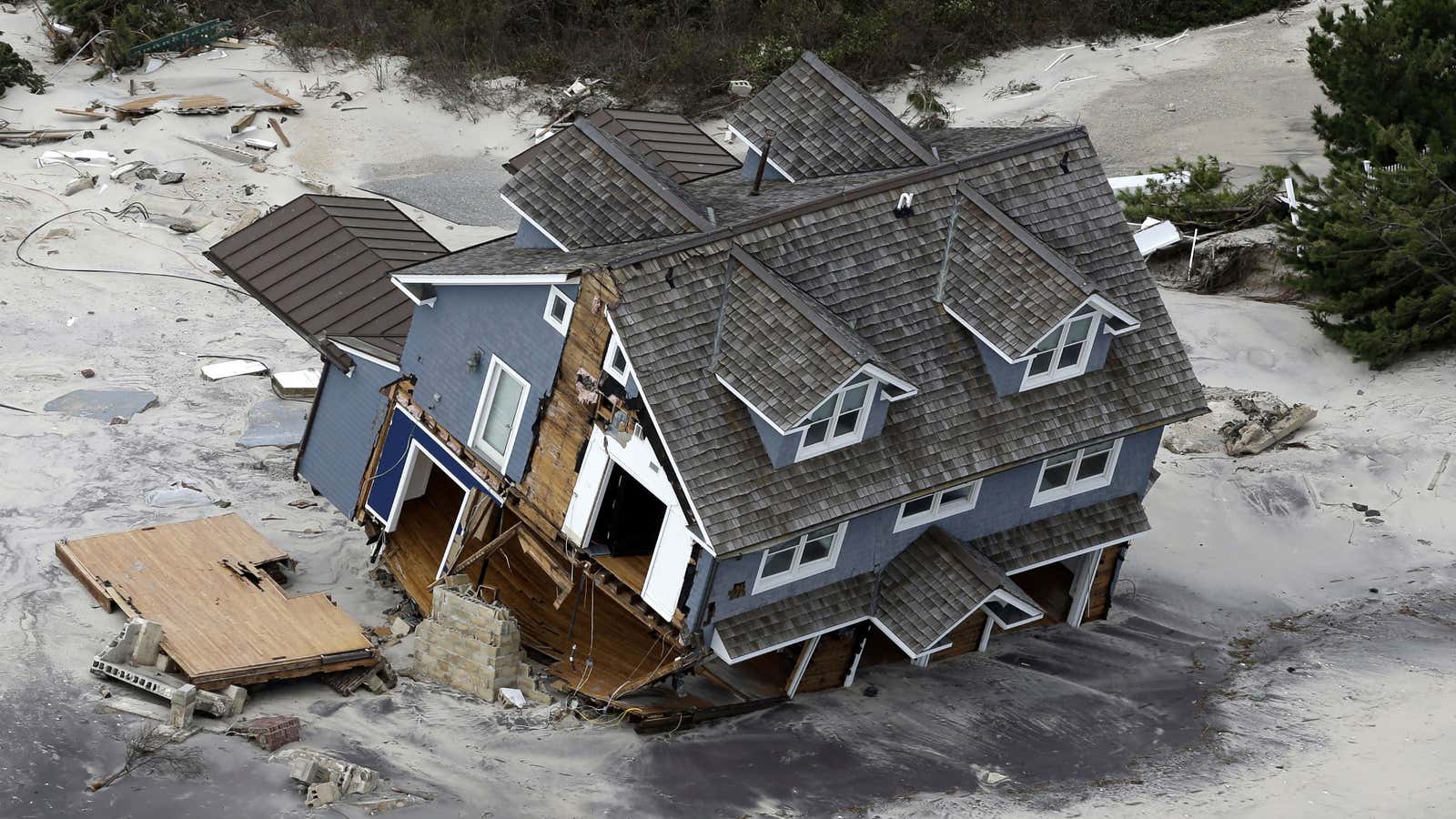In a landmark report, a global panel of leading scientists again called the evidence for climate change “unequivocal” and for the first time said humans are “extremely likely” to be the dominant cause.
Put simply: “Human influence on the climate is clear.” And as this map makes clear, the world has already experienced warming of up to 2.5°C over nearly its entire surface since the start of the 20th century:

The Intergovernmental Panel on Climate Change (IPCC) is convened by the United Nations to give periodic updates on the state of climate science as well as future projections and likely impacts. The group was awarded the Nobel Peace Prize for their last update in 2007.
What makes the IPCC so important is simple: They are required to agree. Last night, the group pulled an all-nighter to ensure that representatives from all 195 member countries agreed on every single word of the 36-page “summary for policymakers” (pdf). That instantly makes the report the world’s scientific and political authority on what is happening to the climate, what will happen in the future, and what needs to be done to avoid the worst impacts.
Here is the report’s side-by-side comparison of the best-case and worst-case scenarios for global climate change in the 21st century. The scenario on the left assumes drastic and immediate global reductions in fossil fuel usage; the right assumes “business as usual” just continues. On the right, runaway climate change causes warming of more than 10°C in some regions, extreme rainfall and droughts become the norm, the Arctic becomes ice-free in the summer, and the ocean becomes much more acidic:

Some other important takeaways from the new document:
• Between 1901–2012, “almost the entire globe has experienced surface warming… Each of the last three decades has been successively warmer at the Earth’s surface than any preceding decade since 1850.”
• ”The rate of sea level rise since the mid-19th century has been larger than the mean rate during the previous two millennia…. It is virtually certain that global mean sea level rise will continue beyond 2100.”
• ”Atmospheric concentrations of CO2, methane, and N2O have increased to levels unprecedented in at least the last 800,000 years….Most aspects of climate change will persist for many centuries even if emissions of CO2 are stopped.”
• “Heat waves are very likely to occur more frequently and last longer…. Extreme precipitation events…will very likely become more intense and more frequent by the end of this century.”
• ”A nearly ice-free Arctic Ocean in September before mid-century is likely.”
• “Continued emissions of greenhouse gases will cause further warming and changes in all components of the climate system…. Limiting climate change will require substantial and sustained reductions of greenhouse gas emissions.”
For the first time, the report mentioned projections of climate change beyond 2100 and painted a picture of a bleak world, possibly unrecognizable to those living today, should fossil fuel use continue on its current trajectory.
The report also raised a note of caution for the first time on the use of so-called “geoengineering technologies” (such as solar shades or carbon dioxide extraction via artificial trees), which are being increasingly considered as last-ditch efforts to neutralize some of the impacts of climate change.
Also concerning was the report’s insistence on new evidence showing a strengthened link between man-made climate change and extreme weather events, particularly heat waves, droughts, and floods. Such extreme weather events cost the United States $110 billion in 2012, most notably from Hurricane Sandy, which brought record coastal flooding to New York City—a portion of which has been linked to global sea level rise.
According to the report, the world can emit about 300 gigatons more carbon (total, ever) before there is a 50% confidence the world will reach warming of 2 degrees Celsius, which is the previously agreed upon “point of no return” for the climate system. For reference, 531 gigatons was emitted from 1870 to 2011. On a continued “business as usual” trajectory, the world will burn through about 5 times that safety limit by 2100, putting the world on a path for warming of more than 4.5 degrees Celsius and about a meter of additional sea level rise. This idea of a ‘global carbon budget’ — a precursor to a possible global price on carbon emissions — was endorsed by the group for the first time.
Without jumping up and down on the desks of their computer terminals, this forum of scientists has done about as much as they can do. With this report, they have proven humankind’s impact on the climate, and confidently projected dire consequences should world governments fail to act immediately.
To help put the report’s results in a human context, the Guardian has created an interactive that calculates how much climate change you will experience in your lifetime.
The full report, due out next week, will total roughly 2,500 pages.
